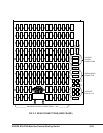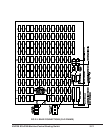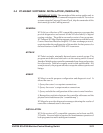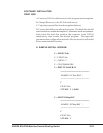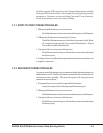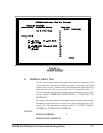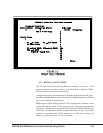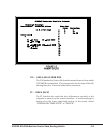
NV3128 RS-422A Machine Control Data Routing Switch 3-3
CHAPTER 3 - OPERATIONS
The NV3128 requires no operator intervention. The router may be
controlled completely via the selected control system. Section 3.1
discusses the connection algorithms for point-to-point (Level I) and
multidrop (Level II) Takes issued by the control system to control the
router. Section 3.2 covers the computer-based management unilities.
3.1 CONNECTION NOTES
The Universal Control/Command Interpreter intercepts XY connection
commands from the router control system and converts them to
connection instructions for the physical crosspoint matrix. The same
commands also determine the configuration of the involved I/O ports,
controlling or controlled. In their simplest form, the received commands
use the following syntax:
New Source -> New Destination
If, for example, the received input specifies "connect I/O port 2 to
I/O port 3," the router does the following two tasks:
1. Configures port 2 as a controlled (the source machine is controlling)
and port 3 as a controlling device ( the destination machine is controlled).
2. Sends a control message to the crosspoint matrix selecting the
appropriate crosspoint connections to open the forward and reverse
data channels. (Note that the forward and reverse data channels can
also be set up using the REV SRC/DEST function in UniDiag. See the
UniDiag manual for details about this function.)
From the perspective of the control system, an I/O port is a tiered
address in the following hierarchy :
MATRIX: ( ignored - or 0 - for all but very large systems)
LEVEL: (0-31)
PORT ADDRESS (0-2048 or larger)
Some NVISION routing switches can be divided into physical partitions,
each partition consisting of a contiguous range of physical addresses,
and each defined as a unique level. However, the NV3128 does not
support true partitioning. Rather, a second, "phantom" partition shadows
the single physical partition and allows it to be addressed on two
logical levels. On the first level, the rules for point-to-point connections
apply. A command at the second level will address the same physical
ports, but will enact the rules for connections with multiple destinations.




